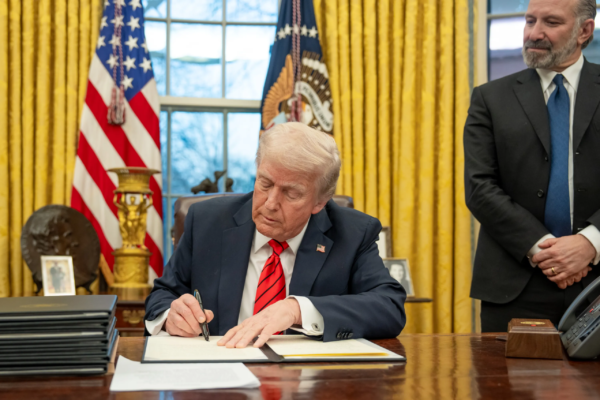
President Trump has signed a sweeping executive order that dilutes Medicare’s ability to negotiate prescription drug prices. Though the White House touts it as a measure to reduce healthcare costs, closer analysis reveals that the real beneficiaries are pharmaceutical companies—not seniors who rely on Medicare for prescription drug coverage.
This move significantly erodes key elements of the Inflation Reduction Act (IRA), a landmark achievement under President Biden which empowered Medicare to directly negotiate drug prices with pharmaceutical companies. Namely, Medicare now will have to wait 13 years until any brand-name drug hits the market before that medication is eligible for price negotiation.
Trump’s executive order mandates Health and Human Services Secretary Robert F. Kennedy Jr. to work with Congress toward revamping Medicare’s price negotiation rules. For Big Pharma, it’s a long-awaited victory. According to Reuters, the order specifically targets the timeline for when drugs become eligible for negotiations, a point of contention for the pharmaceutical industry since the IRA was passed in 2022. This delay aligns with the industry’s lobbying goals to preserve their profits for as long as possible, at the expense of seniors struggling to manage the skyrocketing costs of prescription drugs.
“This change could lead to higher Medicare prescription drug spending, higher prices, and potentially higher Medicare Part D premiums.” – Kaiser Family Foundation, April 17, 2025
Breaking Down the Delays
Under President Biden’s IRA, Medicare could negotiate prices for conventional ‘small-molecule’ drugs after nine years on the market, and for complex biologics after thirteen years. Trump’s executive order proposes extending the negotiation eligibility for small-molecule drugs by an additional four years, creating parity with biosimilars. While this might sound like a minor adjustment, in reality, it gifts Big Pharma a four-year buffer to maintain exorbitant prices on some of the most widely used medications.
“Drugmakers have opposed the IRA’s time frame for negotiation eligibility, arguing it stifles innovation,” Reuters notes. But what does this delay mean for Medicare recipients? For four extra years, Medicare and its beneficiaries will be stuck paying unaffordable prices for essential drugs that could have otherwise been negotiated for lower costs.
Biden’s first round of negotiations under the IRA achieved price cuts of as much as 79% on ten high-cost drugs. These reforms were projected to yield significant savings for Medicare recipients. Trump’s policy reverses course, depriving seniors of immediate access to more affordable treatments while cushioning Big Pharma’s profits.
“The main action that Trump proposed this week is ripped from drug industry talking points. Despite vowing to lower drug prices, the administration concedes explicitly that this particular proposal will actually raise them.” – The American Prospect, 4/16/25
A Gift to Big Pharma, Wrapped in Pseudo-Reform
To deflect from the pro-pharma nature of the order, the Trump administration is branding it as part of broader “healthcare savings” and offering other token measures. The order encourages the FDA to streamline approval processes for generic and biosimilar medications, which are cheaper alternatives to branded drugs. It also allows states to apply for drug importation programs to buy medications from nations like Canada.
These gestures are not new; they have been proposed in previous administrations, including under Biden, and their benefits are dubious at best. For instance, only one state, Florida, has successfully gained FDA approval to import drugs from Canada. Meanwhile, the financial relief promised by generic drugs often takes years to materialize due to industry legal challenges and other hurdles.
Meanwhile, the pharmaceutical companies’ profits remain untouched as they continue charging exorbitant prices for existing drugs. Worse, as Common Dreams points out, Trump’s executive order was an “outright cave to Big Pharma” designed to “delay implementation of price negotiation reform under the guise of market-friendly tweaks.”

Medicare will now have to wait 13 years after a conventional drug hits the market to negotiate its price with Big Pharma
Seniors Are Paying the Price
This policy reversal comes at the worst possible time for seniors, who already face steep out-of-pocket expenses for healthcare. According to Reuters, Trump’s administration also looks to standardize Medicare payment rates across different healthcare facilities, under the pretext of “cost alignment.” While this sounds like it could create savings, healthcare advocates warn that these policies typically shift costs onto individuals, penalizing the very people Medicare is supposed to protect.
Such policies emanate from a Republican playbook that often positions market mechanisms over direct government action in healthcare reform. But when the market in question is controlled by pharmaceutical monopolies, the results are predictable. Prices rise, inequalities deepen, and seniors bear the brunt.
**** For more on the threat the Trump Administration poses to Medicare and Medicaid, listen to the newest episode of our podcast, with special guest Fred Riccardi, President of the Medicare Rights Center. ****


